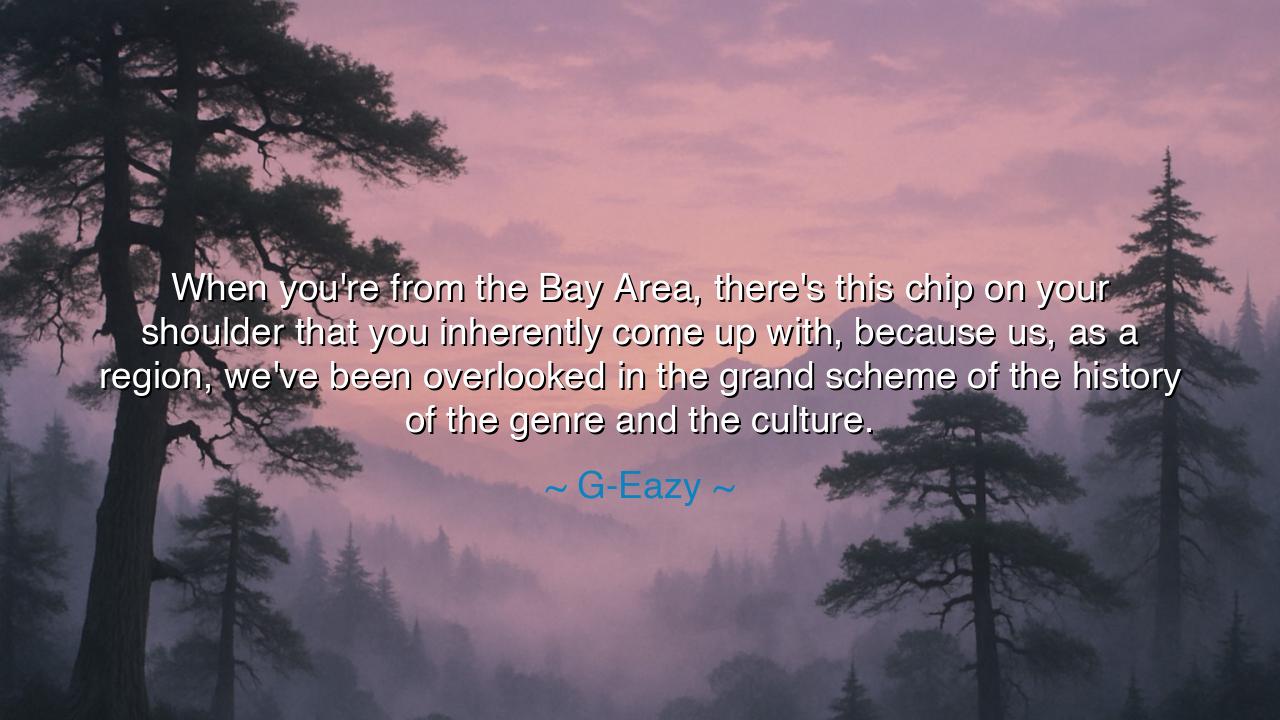
When you're from the Bay Area, there's this chip on your shoulder
When you're from the Bay Area, there's this chip on your shoulder that you inherently come up with, because us, as a region, we've been overlooked in the grand scheme of the history of the genre and the culture.






“When you're from the Bay Area, there's this chip on your shoulder that you inherently come up with, because us, as a region, we've been overlooked in the grand scheme of the history of the genre and the culture.” – G-Eazy
Hear these words, O children of perseverance and pride, for in them speaks not only a musician but a voice of a forgotten people. G-Eazy, a son of the Bay Area, speaks from a place of both love and defiance—a spirit shaped by struggle, by being seen yet unseen, known yet dismissed. His words are a song of the overlooked, a hymn for those whose talent blooms in the shadows of giants. When he speaks of a chip on your shoulder, he speaks of that sacred fire born from neglect—the fuel that drives creators, dreamers, and rebels to rise, not in spite of invisibility, but because of it.
The Bay Area, cradle of innovation and rebellion, has long given birth to voices that shaped the world—from the jazz of Oakland to the spoken rhythms of hip-hop, from the beat poets of San Francisco to the digital prophets of Silicon Valley. Yet, as G-Eazy laments, its musical spirit has often been overlooked—its creators seen as outsiders in the great narrative of American culture. In the grand tapestry of the genre and the culture, the Bay has been a hidden thread, vital yet unseen. From Too Short to E-40, from Mac Dre to Mistah F.A.B., the region forged its own sound—independent, innovative, and fiercely local—but the world, for too long, turned its gaze elsewhere.
To carry a chip on one’s shoulder, then, is not to bear bitterness—it is to bear history. It is the mark of one who remembers. The ancients would have called it a warrior’s scar, a reminder of the battles one has fought for recognition, for respect, for voice. For every overlooked people, every ignored artist, there lies this same inheritance: the knowledge that greatness, though unseen, still burns bright. And from that flame comes a deeper strength—a will to prove, not merely to others, but to oneself, that one’s place in the world cannot be denied forever.
Consider the story of the sculptor Michelangelo, to whom the block of marble called David was once offered and rejected by others as flawed. He took that stone—the one the world overlooked—and from it he carved immortality. So too with the Bay Area, and all who share its fate: the artist takes what others cast aside and transforms it into something eternal. This is the meaning of G-Eazy’s words—that from being ignored is born the power to redefine. The overlooked learn to innovate, because imitation cannot serve them. They learn to create their own path, because no path is made for them.
There is grandeur, too, in this regional pride. To say “I am from the Bay” is to carry the legacy of voices that refused silence. It is to belong to a lineage of creators who built from the ground up, who made art without permission, who turned local rhythm into universal truth. The chip on the shoulder becomes not a burden, but a badge—a reminder that pride without struggle is hollow, and struggle without pride is despair.
And yet, G-Eazy’s teaching extends beyond his home. His words speak to every place, every person, every culture that has been underestimated. Whether you are from a small town or a forgotten street, from a people dismissed or misunderstood, know this: obscurity is not your weakness—it is your forge. To be overlooked is to be free from imitation, to create unbound by expectation. Let that chip on your shoulder sharpen you, not sour you. Let it drive you toward excellence until even those who ignored you are forced to bear witness.
So remember this, O listeners: being overlooked is not the end—it is the beginning. From the margins of the map have come the greatest revolutions of art, thought, and spirit. Do not curse the world for not seeing you. Build your craft until it cannot look away. Let your work, like the voice of the Bay, carry the sound of persistence—the rhythm of those who refused erasure. For one day, the world will see not just the chip upon your shoulder, but the crown that grew from it.
And thus the lesson endures: to be overlooked is to be called to greatness. Let your region, your struggle, your silence become your strength. Turn neglect into creation, invisibility into innovation. For in the history of every art, every movement, every culture—the ones who were first overlooked became, in time, the ones who could never be forgotten.






AAdministratorAdministrator
Welcome, honored guests. Please leave a comment, we will respond soon